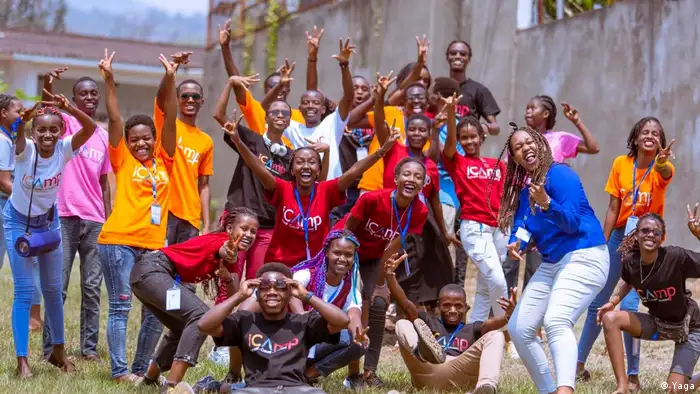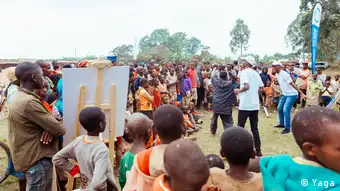Reclaiming social media
How young Burundians reclaim spaces for dialogue despite media repression
Refusing to be intimidated, this trusted media platform has succeeded in ensuring that the voices of young Burundians are heard loud and clear.
This article is part of DW Akademie’s Reclaiming Social Media project, which aims to highlight how media outlets and journalists in the Global South develop innovative initiatives to enhance online discussions of public interest. Following the research phase, the project’s researchers and journalists discussed recommendations for various stakeholders on how to improve constructive public dialogue on social media. To gain inspiration from additional case studies and participate in the discussions, explore the Reclaiming Social Media dossier.
Amid stifling restrictions on freedom of expression in Burundi, one organization stands out. Refusing to be intimidated, this trusted media platform has succeeded in ensuring that the voices of young Burundians are heard loud and clear. This is the story of Yaga – an example of how determined individuals can find ways to speak up and effect real change, despite facing threats in an extremely repressive environment.
Polarization and empowerment: the move to social media
The story of Yaga is closely linked to the 2015 political crisis in Burundi which, among other things, resulted in internet shutdowns and a crackdown on protesters. As Spageon Ngabo, Chief Executive Officer of Yaga, explained in an interview with DW Akademie: “It wasn't easy in 2015 to express your opinion, because the political period was really a tricky one. It was risky for young people and everyone [to speak their mind]. So, during that period even the classic [traditional] media were destroyed.” Approximately 150 journalists left the country at the time.
With large parts of the traditional media shut down or physically destroyed, more and more people turned to social media platforms. While these platforms became an effective way to exchange information, they also were used to spread narratives that drove the conflict. The escalation of hate speech was a particular concern for Ngabo, who was a 25-year-old activist and medical student at the time. As he explains: “It was really a period when people were becoming extremists. […] There was fighting in everything. […] There were people who were arrested because they had posted their opinions. Some people were also chased and had to flee the country.” Women and minorities were affected by this more frequently, especially when occupying public roles in journalism or politics.
A large part of public dialogue had shifted to social media, where all participants exposed themselves to potential attacks, since there was no moderation of the discussions. The founders of Yaga, which means to speak out or discuss in Kirundi, were looking to fill this vacuum and offer a safe discussion space for young people. Ngabo explains: “It is intended to give the youth a safe space in order to express their concerns, their priorities, to propose solutions to the issues they are facing in their lives as well as to participate in different domains of life in the country.” Yaga created a website and social media accounts on YouTube, Facebook, Twitter, and Instagram, where young people can voice their opinions without being attacked or harassed. To ensure this, Yaga has established communication rules for its spaces, which are enforced by a moderation team. Besides ensuring safe and respectful conduct, the moderation team also has to navigate the complex political landscape in Burundi and make sure the organization is not shut down. They involve local authorities in the planning of public events and campaigns, thus preventing interventions or unexpected reactions.
Nevertheless, Yaga’s contributors and employees take big risks by shedding light on suppressed stories and perspectives, facing the threat of arrest or even abduction.
Attracting, training, and encouraging young people
To attract young people to join the conversation, Yaga has set up a network of 150 bloggers and authors who share their takes and opinions in articles, videos, podcasts, Facebook posts, and graphics. Yaga’s contributors now cover a broad range of topics, including politics, economy, culture, health, enterprise, sports, and education, and this content is distributed via Yaga’s social media pages. The Yaga team actively recruits promising young content-creators and bloggers, and “offers trainings to strengthen their skills in both content creation and other topics such as how to recognize and respond to prejudice and disinformation in the media. They are then supervised and coached by the publishers. The most outstanding participants are encouraged to contribute to the platform,” explains Ngabo.
Yaga’s success in encouraging and enabling youth to actively engage in public discussions can be seen in their high number of active followers. Today, Yaga’s Facebook (510,503 followers) and Twitter (66,737 followers) pages have one of the highest number of followers in Burundi. Ngabo reports that thousands of followers regularly engage with the content, and take part in discussions in the comments section. Of course, this resonance also creates a lot of work. Currently, a team of 28 people is working full-time to moderate dialogue and verify information on Yaga’s social media pages as well as during their in-person events. The latter were initiated to address the limited internet access in Burundi. Only 15% of the population have frequent internet access.
Moving between online and offline dialogue
Yaga is addressing this digital divide by creating formats that transport online discussions into offline spaces, and vice versa. One of the formats, Yaga Nawe, has turned into “a well-established and respected forum for discussion.” At these monthly in-person meetings, young people, local authorities, and stakeholders come together to discuss a specific topic. To make these events as inclusive as possible, the meetings are moderated by Yaga employees and organized in various provinces throughout the country. Due to Yaga’s reputation and its cooperation with local authorities, the organization was able to break through official media censorship. Furthermore, local authorities also regularly attend Yaga Nawe debates, directly interacting with and answering questions from the participants, giving them an opportunity to call for accountability.
Yaga’s campaigns and in-person events have also helped to tackle former taboo topics on several occasions, such as the lack of access to sanitary towels for girls and women. Thanks to Yaga’s efforts, these essential items are now zero-rated or made available for free.
Another of Yaga’s achievements was an investigation into drug abuse among young people and its detrimental effects on society. This campaign played a pivotal role in breaking the taboo on discussing drug abuse, and prompted the Ministry of Security to declare the fight against drugs a national priority.
Another remarkable instance of Yaga’s influence was during a Yaga Nawe debate that directly impacted the Agence Burundaise de Promotion des Investissements (API). As a result, the registration fee for new businesses was reduced, encouraging entrepreneurship.
Threats and challenges
Yaga has received threats from individual citizens and organized crime. During the campaign against drug abuse, the organization received threats from drug traffickers who felt threatened by Yaga’s publications. In one incident, a Yaga employee was held hostage for 12 hours by a group who were displeased by Yaga’s reporting.
Despite the repression in the country and the threats, Yaga continues to press forward, driven by the belief in the transformative potential of youth engagement in public dialogue. By creating spaces for young voices to be heard, Yaga has not only created a platform for dialogue but also changed public discourse in Burundi, connecting and encouraging people across different spheres of society.
Key takeaways:
Social media is a powerful tool for campaigning, but often remains limited to the digital realm. Yaga has overcome these limitations by venturing into the offline sphere, where they have successfully influenced policy, illustrating the vital role that determined action beyond the digital realm can play in creating real-world change.
- Experimenting with different formats and building on audience feedback is essential to meet the needs of local communities
- By connecting online and offline formats, online and offline debates can be mutually supportive and help overcome the digital divide
- Actively involving local leaders can help create acceptance and provide accountability
- Moderating social media discussions is key to ensuring the safety of online spaces
The article is adapted from a case study by Gerald Walulya, commissioned by DW Akademie for the Reclaiming Social Media research and advocacy project. Walulya is part of a team of researchers and journalists from Africa, Asia, Europe, Latin America and Middle East North Africa who have researched the current challenges for constructive public dialogue on social media, and ways to tackle them.
DW recommends
- Date 26.09.2023
- Author David Schneider
- Feedback: Send us your feedback.
- Print Print this page
- Permalink https://p.dw.com/p/4WeNj
- Date 26.09.2023
- Author David Schneider
- Send us your feedback.
- Print Print this page
- Permalink https://p.dw.com/p/4WeNj


